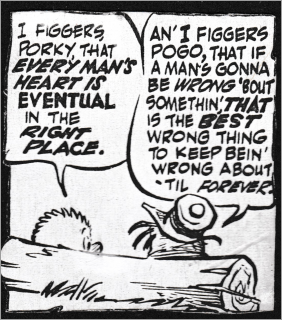In the end, what are man’s truths? His irrefutable errors.
[Was sind denn zuletzt die Wahrheiten des Menschen? — Es sind die unwiderlegbaren Irrthümer des Menschen.]
Friedrich Nietzsche (1844-1900) German philosopher and poet
The Gay Science [Die fröhliche Wissenschaft], Book 3, § 265 (1882) [tr. Hill (2018)]
(Source)
Also known as La Gaya Scienza, The Joyful Wisdom, or The Joyous Science.
(Source (German)). Alternate translations:
But what after all are man's truths? -- They are his irrefutable errors.
[tr. Common (1911)]
What are man's truths ultimately? Merely his irrefutable errors.
[tr. Kaufmann (1974)]
What, then, are man's truths ultimately? -- They are the irrefutable errors of man.
[tr. Nauckhoff (2001)]
Quotations about:
error
Note not all quotations have been tagged, so Search may find additional quotes on this topic.
Where this will end? In the Abyss, one may prophecy; whither all Delusions are, at all moments, traveling; where this Delusion has now arrived. For if there be a Faith, from of old, it is this, as we often repeat, that no Lie can live for ever. The very Truth has to change its vesture, from time to time; and be born again. But all Lies have sentence of death written down against them, and Heaven’s Chancery itself; and, slowly or fast, advance incessantly towards their hour.
Thomas Carlyle (1795-1881) Scottish essayist and historian
The French Revolution: A History, Part 1, Book 6, ch. 3 (1.6.3) (1837)
(Source)
Carlyle is speaking of the delusion that the wealthy and land-owners of pre-Revolutionary France could forever oppress their tenants with taxes and rent without finally driving them to bloody revolution.
A core phrase here was latched onto by Martin Luther King, Jr., who incorporated it as standard fare in his speeches in the mid- and late 1960s.
We shall overcome, because Carlyle is right, "No lie can live forever."
[Examples: 1, 2, 3, 4]
The mania afflicting most French people is the desire to be witty, and the mania afflicting those who want to be witty is the desire to write books.
However, this is a very bad idea.
[La fureur de la plupart des François, c’est d’avoir de l’esprit ; et la fureur de ceux qui veulent avoir de l’esprit, c’est de faire des livres.
Cependant il n’y a rien de si mal imaginé.]Charles-Lewis de Secondat, Baron de Montesquieu (1689-1755) French political philosopher
Persian Letters [Lettres Persanes], Letter 66, Rica to *** (1721) [tr. MacKenzie (2014), No. 64]
(Source)
(Source (French)). Alternate translations:
The Predominant Passion or rather Fury of most of the French is, to be thought Wits; and the Predominant passion of those who would be thought Wits, is to write Books.
And yet there is nothing so ill-contrived.
[tr. Ozell (1736 ed.), No. 64]
The passion of most of the French is to be taken for wits, and the passion of thole who would be thought wits, is to write books. And yet there is nothing so badly imagined.
[tr. Floyd (1762)]
The passion of nearly every Frenchman, is to pass for a wit; and the passion of those who wish to be thought wits, is to write books.
There never was such an erroneous idea.
[tr. Davidson (1891)]
The passion of most Frenchmen is to be thought wits ; and the passion of those who wish to be thought wits is to write books.
It is impossible to imagine a more unfortunate mania.
[tr. Betts (1897)]
The passion of most of the French is to be thought witty, and the passion of those who wish to be considered wits is to write books.
A worse misconception cannot be imagined.
[tr. Healy (1964)]
Most Frenchmen are desperately eager to be thought witty and, of those who seek to be witty, most are desperately eager to write a book.
No plan, however, could be less well conceived.
[tr. Mauldon (2008), No. 64]
Pride plays a greater part than kindness in our censure of a neighbor’s faults. We criticize faults less to correct them, than to prove that we do not possess them.
[L’orgueil a plus de part que la bonté aux remontrances que nous faisons à ceux qui commettent des fautes; et nous ne les reprenons pas tant pour les en corriger que pour leur persuader que nous en sommes exempts.]
François VI, duc de La Rochefoucauld (1613-1680) French epigrammatist, memoirist, noble
Réflexions ou sentences et maximes morales [Reflections; or Sentences and Moral Maxims], ¶37 (1665-1678) [tr. Heard (1917)]
(Source)
Present from the first edition. (Source (French)). Alternate translations:
We are liberal of our remonstrances and reprehensions towards those, whom we think guilty of miscarriages; but we therein betray more pride, than charity. Our reproving them does not so much proceed from any desire in us of their reformation, as from an insinuation that we our selves are not chargeable with the like faults.
[tr. Davies (1669), ¶142]
Pride hath a greater share than Goodness in the reproofs we give other people for their faults; and we chide them, not so much with a design to mend them, as to make them believe that we ourselves are not guilty of them.
[tr. Stanhope (1694), ¶38]
Pride is more concerned than benevolence in our remonstrances to persons guilty of faults; and we reprove them not so much with a design to correct, as to make them believe that we ourselves are free from such failings.
[pub. Donaldson (1783), ¶349; ed. Lepoittevin-Lacroix (1797), ¶37]
In our reprehensions, pride has a greater share than good nature. We reprove, not so much in order to correct, as to intimate that we hold ourselves free from such failings.
[ed. Carville (1835), ¶309]
Pride has a greater share than goodness of heart in the remonstrances we make to those who are guilty of faults; we reprove not so much with a view to correct them as to persuade them that we are exempt from those faults ourselves.
[ed. Gowens (1851), ¶38]
Pride has a larger part than goodness in our remonstrances with those who commit faults, and we reprove them not so much to correct as to persuade them that we ourselves are free from faults.
[tr. Bund/Friswell (1871), ¶37]
Pride, rather than virtue, makes us reprove those who have done wrong; our reproaches are not so much intended to improve the evil-doer, as to show him that we are quite free of his taint.
[tr. FitzGibbon (1957), ¶37]
Pride plays a greater part than kindness in our remonstrating with those who make mistakes; and we point out their faults, less to correct them than to indicate they are not ours.
[tr. Kronenberger (1959), ¶37]
Pride plays a greater part than kindness in the reprimands we address to wrongdoers; we reprove them not so much to reform them as to make them believe that we are free from their faults.
[tr. Tancock (1959), ¶37]
Pride shares a greater part than the goodness of our hearts in the reprimands we give to those who commit faults; and we do not reprove so much in order to correct them, as in order to persuade them that we are ourselves exempt from those faults.
[tr. Whichello (2016), ¶37]
And remember, we all stumble, every one of us. That’s why it’s a comfort to go hand in hand.
Emily Kimbrough (1899-1989) American author and journalist
The Innocents from Indiana, ch. 17 (1950)
(Source)
At the very end of the book, a note from the protagonist's mother, about the protagonist having failed the entrance examination to Bryn Mawr.
Better slip with foot than tongue.
Benjamin Franklin (1706-1790) American statesman, scientist, philosopher, aphorist
Poor Richard (1734 ed.)
(Source)
There are two kinds of clocks. There is the clock that is always wrong, and that knows it is wrong, and glories in it; and there is the clock that is always right — except when you rely upon it, and then it is more wrong than you would think a clock could be in a civilized country.
Jerome K. Jerome (1859-1927) English writer, humorist [Jerome Klapka Jerome]
“Clocks,” Diary of a Pilgrimage, and Six Other Essays (1891)
(Source)
It is a piece of idle sentimentality that truth, merely as truth, has any inherent power denied to error, of prevailing against the dungeon and the stake. Men are not more zealous for truth than they often are for error, and a sufficient application of legal or even of social penalties will generally succeed in stopping the propagation of either. The real advantage which truth has, consists in this, that when an opinion is true, it may be extinguished once, twice, or many times, but in the course of ages there will generally be found persons to rediscover it, until some one of its reappearances falls on a time when from favourable circumstances it escapes persecution until it has made such head as to withstand all subsequent attempts to suppress it.
Think wrongly, if you please, but in all cases think for yourself.
Gotthold Lessing (1729-1781) German playwright, philosopher, dramaturg, writer
(Attributed)
I cannot find an original source, but as early as 1847 this phrase (or this English translation) was connected with him, and the quote is mentioned in his biography Gotthold Ephraim Lessing: His Life and His Works (1878), by Helen Zimmern, who translated a number of his pieces.
Frequently misattributed to the modern English author Doris Lessing, perhaps because it is so misattributed on Wikiquote. There it is cited to an interview by Amanda Craig, "Grand dame of letters who's not going quietly," The Times of London (2003-11-23). The reference there is behind a paywall, so it's unclear if Lessing actually says it in the interview, or it is erroneously referenced by the author.
The quotation is also attributed to the Egyptian philosopher Hypatia.
CAMILLO:My gracious lord,
I may be negligent, foolish, and fearful.
In every one of these no man is free,
But that his negligence, his folly, fear,
Among the infinite doings of the world,
Sometime puts forth. In your affairs, my lord,
If ever I were willful-negligent,
It was my folly; if industriously
I played the fool, it was my negligence,
Not weighing well the end; if ever fearful
To do a thing where I the issue doubted,
Whereof the execution did cry out
Against the non-performance, ’twas a fear
Which oft infects the wisest. These, my lord,
Are such allowed infirmities that honesty
Is never free of.William Shakespeare (1564-1616) English dramatist and poet
Winter’s Tale, Act 1, sc. 2, l. 310ff (1.2.310-325) (1611)
(Source)
Pedantry prides herself on being wrong by rules; while common sense is contented to be right, without them.
Charles Caleb "C. C." Colton (1780-1832) English cleric, writer, aphorist
Lacon: Or, Many Things in Few Words, Vol. 1, § 48 (1820)
(Source)
There are some men who listen neither to reason nor to good advice, and who deliberately go astray through fear of being dominated.
[Il se trouve des hommes qui n’écoutent ni la raison ni les bons conseils, et qui s’égarent volontairement par la crainte qu’ils ont d’être gouvernés.]
Jean de La Bruyère (1645-1696) French essayist, moralist
The Characters [Les Caractères], ch. 4 “Of the Affections [Du Coeur],” § 71 (4.71) (1688) [tr. Stewart (1970)]
(Source)
(Source (French)). Alternate translations:
There are those men who will not hearken to reason, or good council, but deviate of their own Heads, purely for fear of being govern'd.
[Bullord ed. (1696)]
There are some Men who will not hearken to Reason and good Counsel, but deviate of their own Heads, purely for fear of being govern'd.
[Curll ed. (1713)]
There are some Men who turn the deaf Ear to Reason and friendly Counsel, and play the Fool of their own Heads, purely for fear of being governed.
[Browne ed. (1752)]
There are some men who turn a deaf ear to reason and good advice, and willfully go wrong for fear of being controlled.
[tr. Van Laun (1885)]
How does it help us to say that the Bible is the inerrant word of God if in fact we don’t have the words that God inerrantly inspired, but only the words copied by the scribes — sometimes correctly but sometimes (many times!) incorrectly? What good is it to say that the autographs (i.e., the originals) were inspired? We don’t have the originals! We have only error-ridden copies, and the vast majority of these are centuries removed from the originals and different from them, evidently, in thousands of ways.
Bart D. Ehrman (b. 1955) American Biblical scholar, author
Misquoting Jesus, Introduction (2005)
(Source)
This life of ours — if a life so full of such great ills can properly be called a life — bears witness to the fact that, from its very start, the race of mortal men has been a race condemned. Think, first, of that dreadful abyss of ignorance from which all error flows and so engulfs the sons of Adam in a darksome pool that no one can escape without the toll of toils and tears and fears. Then, take our very love for all those things that prove so vain and poisonous and breed so many heartaches, troubles, griefs, and fears; such insane joys in discord, strife, and war; such wrath and plots of enemies, deceivers, sycophants; such fraud and theft and robbery; such perfidy and pride, envy and ambition, homicide and murder, cruelty and savagery, lawlessness and lust; all the shameless passions of the impure — fornication and adultery, incest and unnatural sins, rape and countless other uncleannesses too nasty to be mentioned; the sins against religion — sacrilege and heresy, blasphemy and perjury; the iniquities against our neighbors — calumnies and cheating, lies and false witness, violence to persons and property; the injustices of the courts and the innumerable other miseries and maladies that fill the world, yet escape attention.
It is true that it is wicked men who do such things, but the source of all such sins is that radical canker in the mind and will that is innate in every son of Adam. For, our infancy proves with what ignorance of the truth man enters upon life, and adolescence makes clear to all the world how full we are of folly and concupiscence. In fact, if anyone were left to live as he pleased and to do what he desired, he would go through practically the whole gamut of lawlessnesses and lust — those which I have just listed and, perhaps, others that I refrained from mentioning.[Nam quod ad primam originem pertinet, omnem mortalium progeniem fuisse damnatam, haec ipsa uita, si uita dicenda est, tot et tantis malis plena testatur. Quid enim aliud indicat horrenda quaedam profunditas ignorantiae, ex qua omnis error existit, qui omnes filios Adam tenebroso quodam sinu suscepit, ut homo ab illo liberari sine labore dolore timore non possit? Quid amor ipse tot rerum uanarum atque noxiarum et ex hoc mordaces curae, perturbationes, maerores, formidines, insana gaudia, discordiae, lites, bella, insidiae, iracundiae, inimicitiae, fallacia, adulatio, fraus, furtum, rapina, perfidia, superbia, ambitio, inuidentia, homicidia, parricidia, crudelitas, saeuitia, nequitia, luxuria, petulantia, inpudentia, inpudicitia, fornicationes, adulteria, incesta et contra naturam utriusque sexus tot stupra atque inmunditiae, quas turpe est etiam dicere, sacrilegia, haereses, blasphemiae, periuria, oppressiones innocentium, calumniae, circumuentiones, praeuaricationes, falsa testimonia, iniqua iudicia, uiolentiae, latrocinia et quidquid talium malorum in mentem non uenit et tamen de uita ista hominum non recedit? Verum haec hominum sunt malorum, ab illa tamen erroris et peruersi amoris radice uenientia, cum qua omnis filius Adam nascitur. Nam quis ignorat cum quanta ignorantia ueritatis, quae iam in infantibus manifesta est, et cum quanta abundantia uanae cupiditatis, quae in pueris incipit apparere, homo ueniat in hanc uitam, ita ut, si dimittatur uiuere ut uelit et facere quidquid uelit, in haec facinora et flagitia, quae commemoraui et quae commemorare non potui, uel cuncta uel multa perueniat?]
Augustine of Hippo (354-430) Christian church father, philosopher, saint [b. Aurelius Augustinus]
City of God [De Civitate Dei], Book 22, ch. 22 (22.22) (AD 412-416) [tr. Walsh/Honan (1954)]
(Source)
(Source (Latin)). Alternate translations:
Concerning man’s first origin, our present life (if such a miserable estate can be called a life) does sufficiently prove that all his children were condemned in him. What else does that horrid gulf of ignorance confirm, whence all error has birth, and wherein all the sons of Adam are so deeply drenched, that none can be freed without toil, fear, and sorrow? What else does our love of vanities affirm, whence there arises such a tempest of cares, sorrows, repinings, fears, mad exultations, discords, altercations, wars, treasons, furies, hates, deceits, flatteries, thefts, rapines, perjuries, pride, ambition, envy, murder, parricide, cruelty, villainy, luxury, impudence, unchastity, fornications, adulteries, incests, several sorts of sins against nature (filthy even to be named), sacrilege, heresy, blasphemy, oppression, calumnies, circumventions, deceits, false witnesses, false judgments, violence, robberies, and suchlike out of my remembrance to reckon, but not excluded from the life of man? All these evils are belonging to man, and arise out of the root of that error and perverse affection which every son of Adam brings into the world with him. For who does not know in what a mist of ignorance (as we see in infants) and with what a crew of vain desires (as we see in boys) all mankind enters this world, so that if man were left unto his own election, he would fall into most of the aforesaid mischiefs?
[tr. Healey (1610)]
That the whole human race has been condemned in its first origin, this life itself, if life it is to be called, bears witness by the host of cruel ills with which it is filled. Is not this proved by the profound and dreadful ignorance which produces all the errors that enfold the children of Adam, and from which no man can be delivered without toil, pain, and fear? Is it not proved by his love of so many vain and hurtful things, which produces gnawing cares, disquiet, griefs, fears, wild joys, quarrels, lawsuits, wars, treasons, angers, hatreds, deceit, flattery, fraud, theft, robbery, perfidy, pride, ambition, envy, murders, parricides, cruelty, ferocity, wickedness, luxury, insolence, impudence, shamelessness, fornications, adulteries, incests, and the numberless uncleannesses and unnatural acts of both sexes, which it is shameful so much as to mention; sacrileges, heresies, blasphemies, perjuries, oppression of the innocent, calumnies, plots, falsehoods, false witnessings, unrighteous judgments, violent deeds, plunderings, and whatever similar wickedness has found its way into the lives of men, though it cannot find its way into the conception of pure minds? These are indeed the crimes of wicked men, yet they spring from that root of error and misplaced love which is born with every son of Adam. For who is there that has not observed with what profound ignorance, manifesting itself even in infancy, and with what superfluity of foolish desires, beginning to appear in boyhood, man comes into this life, so that, were he left to live as he pleased, and to do whatever he pleased, he would plunge into all, or certainly into many of those crimes and iniquities which I mentioned, and could not mention?
[tr. Dods (1871)]
This very life, if life it can be called, pregnant with so many dire evils, bears witness that from its very beginning all the progeny of mankind was damned. For what else is the meaning of the dreadful depth of ignorance, from which all error arises, which has taken to its bosom, so to speak, all the sons of Adam in its dark embrace, so that man cannot be freed from that embrace without toil, pain and fear? What is the meaning of the love of so many vain and harmful things, from which come gnawing cares, passions, griefs, fears, mad joys, discords, strifes, wars, plots, wraths, enmities, deceits, flattery, fraud, theft, robbery, perfidy, pride, ambition, envy, murder, parricide, cruelty, ferocity, vileness, riotous living, disorderly conduct, impudence, shamelessness, fornication, adultery, incest and so many outrageous and foul forms of unnatural vice in each sex which it is indecent even to mention, sacrilege, heresies, blasphemies, perjuries, oppressions of the innocent, calumnies, deceptions, duplicities, false witness, unjust verdicts, violence, brigandage and all the other evils which come not to mind, but still do not pass from this life of men? Yes, these are misdeeds of bad men, for they spring from that root of error and perverse love with which every son of Adam is born. Indeed, who does not know with what ignorance of truth, manifest already in infancy, and with what excess of vain desire, which begins to appear in childhood, man comes into this life, so that if he is allowed to live and do as he likes, he falls into all, or many, of these misdeeds and crimes which I have rehearsed, and others which I was unable to rehearse?
[tr. Green (Loeb) (1972)]
As for that first origin of mankind, this present life of ours (if a state full of so much grievous misery can be called a life) is evidence that all the mortal descendants of the first man came under condemnation. Such is the clear evidence of that terrifying abyss of ignorance, as it may be called, which is the source of all error, in whose gloomy depths all the sons of Adam are engulfed, so that man cannot be rescued from it without toil, sorrow and fear. What else is the message of all the evils of humanity? The love of futile and harmful satisfactions, with its results: carking anxieties, agitations of mind, disappointments, fears, frenzied joys, quarrels, disputes, wars, treacheries, hatreds, enmities, deceits, flattery, fraud, theft, rapine, perfidy, pride, ambition, envy, murder, parricide, cruelty, savagery, villainy, lust, promiscuity, indecency, unchastity, fornication, adultery, incest, unnatural vice in men and women (disgusting acts too filthy to be named), sacrilege, collusion, false witness, unjust judgement, violence, robbery, and all other such evils which do not immediately come to mind, although they never cease to beset this life of man -- all these evils belong to man in his wickedness, and they all spring from that root of error and perverted affection which every son of Adam brings with him at his birth. For who is not aware of the vast ignorance of the truth (which is abundantly seen in infancy) and the wealth of futile desires (which begins to be obvious in boyhood) which accompanies a man on his entrance into this world, so that if man were left to live as he chose and act as he pleased he would fall into all, or most, of those crimes and sins which I have mentioned -- and others which I was not able to mention.
[tr. Bettenson (1972)]
This life itself, if it is to be called a life, attests, by the many great evils with which it is filled, that the whole mortal progeny of the first man stands condemned. What could show this more clearly than that dreadful and profound ignorance from which springs all the error which imprisons the sons of Adam in a dark place from which no man can be delivered without toil, pain and fear? Is this not proved by his love of so many vain and harmful things, from which come gnawing cares, disturbances, griefs, fears, insane joys, discords, litigation, wars, treasons, angers, hatreds, falsehood, flattery, fraud, theft, rapine, perfidy, pride, ambition, envy, homicides, parricides, cruelty, ferocity, wickedness, luxury, insolence, immodesty, unchastity, fornications, adulteries, incests, and so many other impure and unnatural acts of both sexes of which it is shameful even to speak; sacrileges, heresies, blasphemies, perjuries, oppression of the innocent, slanders, plots, prevarications, false witness, unrighteous judgments, acts of violence, robberies, and other such evils which do not immediately come to mind, but which are never far away from men in this life? Truly, these are the crimes of wicked men; yet they come forth from that root of error and perverse love which is born with every son of Adam. For who does not know how great is our ignorance of the truth, manifesting itself even in infancy? Who does not know with what an abundance of vain desires, beginning to appear in boyhood, a man comes into this life? So true is this that, if a man were left to live as he wished and do whatever he liked, he would fall into all, or certainly into many, of those crimes and iniquities which I mentioned and could not mention.
[tr. Dyson (1998)]
No form of liberty is worth a darn which doesn’t give us the right to do wrong now and then.
H. L. Mencken (1880-1956) American writer and journalist [Henry Lewis Mencken]
A Little Book in C Major, ch. 3, § 16 (1916)
(Source)
Take then good note of it. Nothing is too small. I counsel you, put down in record even your doubts and surmises. Hereafter it may be of interest to you to see how true you guess. We learn from failure, not from success!
Abraham "Bram" Stoker (1847-1912) Irish author, theater manager, journalist
Dracula, ch. 10, Dr. Seward’s Diary, 7 September [Abraham Van Helsing] (1897)
(Source)
But if I err in this Opinion, that the Soul of Man is immortal, sure it is a pleasing Error, so pleasing that I can never shake it off while I live.
[Quod si in hoc erro, qui animos hominum immortalis esse credam, libenter erro nec mihi hunc errorem, quo delector, dum vivo, extorqueri volo.]
Marcus Tullius Cicero (106-43 BC) Roman orator, statesman, philosopher
De Senectute [Cato Maior; On Old Age], ch. 23 / sec. 85 (23.85) (44 BC) [tr. J. D. (1744)]
(Source)
(Source (Latin)). Alternate translations:
But if it be in erroure and oute of trouthe aftir the doctryne and scole of Epycures by cause that I beleve that the soules be undedly and Immortelle perdurable and evirlastyng I answere you that this errour pleasith me and I consente me in it right gladly and as long tyme as I lyve I wille not that any philosopher nor any othir of what condicyon that evir he be take awey fro me this erroure wherin I delyte me.
[tr. Worcester/Worcester/Scrope (1481)]
And if I do err because I think that the souls of men be immortal, verily I am well contented in the same error still to continue, and as long as I live I will never renounce nor recant the same, wherein I take such singular pleasure and comfort.
[tr. Newton (1569)]
But if I do erre that the soules of men bee immortall, I do err willingly, neither will I while I live be wrested from mine opinion wherein I am delighted.
[tr. Austin (1648), ch. 24]
My hope's, if this assurance hath deceiv'd,
(That I Man's Soul Immortal have believ'd)
And if I erre, no Pow'r shall dispossess
My thoughts of that expected happiness.
[tr. Denham (1669), Part 4]
But if I should be mistaken in this Belief, that our Souls are immortal, I am however pleased and happy in my Mistake; nor while I live, shall it ever be in the Power of Man, to beat me out of an Opinion, that yields me so solid a Comfort, and so durable a Satisfaction.
[tr. Logan (1744)]
And after all should this my firm persuasion of the soul's immortality prove to be a mere delusion, it is at least a pleasing delusion, and I will cherish it to my latest breath.
[tr. Melmoth (1773)]
But if I err in this, that I believe the soules of men to be immortal, I err willingly, nor do I wish this error to be wrested from me while I live.
[Cornish Bros. ed. (1847)]
And if I am wrong in this, that I believe the souls of men to be immortal, I willingly delude myself : nor do I desire that this mistake, in which I take pleasure, should be wrested from me as long as I live.
[tr. Edmonds (1874)]
But if I err in believing that the souls of men are immortal, I am glad thus to err, nor am I willing that this error in which I delight shall be wrested from me so long as I live.
[tr. Peabody (1884)]
But if I am wrong in thinking the human soul immortal, I am glad to be wrong; nor will I allow the mistake which gives me so much pleasure to be wrested from me as long as I live.
[tr. Shuckburgh (1895)]
But if in thinking souls immortal thus,
I am in error, I confess to you,
It is an error that I glory in,
And being so pleasant, I would not desire
To lose it while I live.
[tr. Allison (1916)]
And if I err in my belief that the souls of men are immortal, I gladly err, nor do I wish this error which gives me pleasure to be wrested from me while I live.
[tr. Falconer (1923)]
Even if I am mistaken in my belief that the soul is immortal, I make the mistake gladly, for the belief makes me happy, and is one which as long as I live I want to retain.
[tr. Grant (1960, 1971 ed.)]
And if I am deluded in believing that the soul of man is immortal, then I am glad to be deluded, and I hope no one, as long as I live, will ever wrench this delusion from me.
[tr. Copley (1967)]
But if I am mistaken in this belief of mine that the souls of men are immortal, then I am happy to be mistaken; but as long as I am still alive, I have no wish to be disabused of my mistake.
[tr. Cobbold (2012)]
I may be wrong in my belief in the immorality of the spirit: there are philosophers who think I am. I like my faith and I don't want to lose it.
[tr. Gerberding (2014)]
And if it is an error of mine to imply
That man is endowed with immortal soul,
I err with pleasure and promptly console
Myself as long as I am alive and spry.
[tr. Bozzi (2015)]
And if I’m wrong in my belief that souls are immortal, then gladly do I err, for this belief, which I hope to maintain as long as I live, makes me happy.
[tr. Freeman (2016)]
It is almost as difficult to make a man unlearn his errors as his knowledge. Mal-information is more hopeless than non-information; for error is always more busy than ignorance. Ignorance is a blank sheet, on which we may write; but error is a scribbled one, on which we must first erase. Ignorance is contented to stand still with her back to the truth; but error is more presumptuous, and proceeds in the same direction. Ignorance has no light, but error follows a false one. The consequence is, that error, when she retraces her footsteps, has further to go, before she can arrive at the truth, than ignorance.
Charles Caleb "C. C." Colton (1780-1832) English cleric, writer, aphorist
Lacon: Or, Many Things in Few Words, Vol. 1, § 1 (1820)
(Source)
With just enough of learning to misquote.
George Gordon, Lord Byron (1788-1824) English poet
“English Bards and Scotch Reviewers,” l. 66ff (1809)
(Source)
He that avoideth not small faults, by little and little falleth into greater.
[Qui parvos non devitat defectus, paulatim labitur ad majora.]
Thomas à Kempis (c. 1380-1471) German-Dutch priest, author
The Imitation of Christ [De Imitatione Christi], Book 1, ch. 25, v. 10 (1.25.10) (c. 1418-27) [tr. Anon. (1901)]
(Source)
Cross-referenced in some sources to Ecclesiasticus (Sirach) 19:1 -- "One who despises small things will fail little by little."
(Source (Latin)). Alternate translations:
He that will not flee small sins, shall by little and little fall into greater.
[tr. Whitford/Raynal (1530/1871)]
He who will not flee small sins will, by little and little, fall into greater sins.
[tr. Whitford/Gardner (1530/1955)]
He that avoideth not small slips, by litle and litle may take a great fall.
[tr. Page (1639), 1.25.39]
He who does not inure himself to vanquishing by subduing less temptations, will never be able to grapple with more violent and trying ones; and infirmities once yielded to, grow insensibly to stubborn habits of vice.
[tr. Stanhope (1696; 1809 ed.), "The Christian's Pattern"]
He who is not careful to resist and subdue small sins, will insensibly fall into greater.
[tr. Payne (1803), 1.25.12]
He that avoideth not small faults, by little and little falleth into greater.
[ed. Parker (1841)]
He who is not careful to resist small sins, will insensibly fall into greater.
[tr. Dibdin (1851)]
He that does not shun small defects, by little and little falls into greater.
[ed. Bagster (1860)]
He who shunneth not small faults falleth little by little into greater.
[tr. Benham (1874)]
He who does not overcome small faults, shall fall little by little into greater ones.
[tr. Croft/Bolton (1940)]
He who does not try to shun small faults slips little and little into greater ones.
[tr. Daplyn (1952)]
The man who doesn't keep clear of petty faults will gradually slip into graver ones.
[tr. Knox-Oakley (1959)]
The man who does not avoid small failings gradually drifts into greater ones.
[tr. Knott (1962)]
If you do not avoid small faults, you will soon commit greater ones.
[tr. Rooney (1979)]
The person who does not avoid small faults, little by little slips into greater ones.
[tr. Creasy (1989)]
Usually one’s cooking is better than one thinks it is. And if the food is truly vile, as my ersatz eggs Florentine surely were, then the cook must simply grit her teeth and bear it with a smile — and learn from her mistakes.
Julia Child (1912-2004) American chef and writer
My Life In France, “Le Cordon Bleu,” sec. 2 (2006)
(Source)
I tell you this, and I tell you plain:
What you have done, you will do again;
You will bite your tongue, careful or not,
Upon the already-bitten spot.Mignon McLaughlin (1913-1983) American journalist and author
The Neurotic’s Notebook, ch. 5 (1963)
(Source)
Progress in science is often built on wrong theories that are later corrected. It is better to be wrong than to be vague.
Freeman Dyson (1923-2020) English-American theoretical physicist, mathematician, futurist
The Scientist as Rebel, Part 3, ch. 19 “The World on a String” (2006)
(Source)
Originally published in New York Review of Books (2003-11-06).
I don’t care how smart you are, if you say something you are liable to say something foolish, and the smarter you are, and the longer you talk, the more foolish things you will say.
We have no right to prejudice another in his civil enjoiments because he is of another church. If any man err from the right way, it is his own misfortune, no injury to thee; nor therefore art thou to punish him in the things of this life because thou supposeth he will be miserable in that which is to come — on the contrary accdg to the spirit of the gospel, charity, bounty, liberality is due to him.
Thomas Jefferson (1743-1826) American political philosopher, polymath, statesman, US President (1801-09)
Notes on Religion (Oct 1776?)
(Source)
Labeled by Jefferson "Scraps Early in the Revolution."
Do not persist in folly. Some make a duty of failure and having started down the wrong road, think it a badge of character to continue.
[No proseguir la necedad. Hacen algunos empeño del desacierto, y porque comenzaron a errar, les parece que es constancia el proseguir.]
Baltasar Gracián y Morales (1601-1658) Spanish Jesuit priest, writer, philosopher
The Art of Worldly Wisdom [Oráculo Manual y Arte de Prudencia], § 261 (1647) [tr. Fischer (1937)]
(Source)
(Source (Spanish)). Alternate translations:
Not to continue a Foppery. Some make an engagement of their mistakes: when they have once begun to fail, they think they are concerned in honour to continue.
[Flesher ed. (1685)]
Do not follow up a Folly. Many make an obligation out of a blunder, and because they have entered the wrong path thinks it proves their strength of character to go in it.
[tr. Jacobs (1892)]
Don’t persist in folly. Some people commit themselves to their errors. They act mistakenly and consider it constancy to go on that way.
[tr. Maurer (1992)]
The greatest of sages can commit one mistake, but not two; he may fall into error, but he doesn’t lie down and make his home there.
[En un descuido puede caer el mayor sabio, pero en dos no; y de paso, que no de asiento.]
Baltasar Gracián y Morales (1601-1658) Spanish Jesuit priest, writer, philosopher
The Art of Worldly Wisdom [Oráculo Manual y Arte de Prudencia], § 214 (1647) [tr. Maurer (1992)]
(Source)
(Source (Spanish)). Alternate translations:
The wisest man may very well fail once, but not twice; transiently, and by inadvertency, but not deliberately.
[Flesher ed. (1685)]
A wise man may make one slip but never two, and that only in running, not while standing still.
[tr. Jacobs (1892)]
The wisest of men may slip once, but not twice, and that only by chance, and not by design.
[tr. Fischer (1937)]
Hitherto I have been under the guidance of that portion of reason which He has thought proper to deal out to me. I have followed it faithfully in all important cases, to such a degree at least as leaves me without uneasiness; and if on minor occasions I have erred from its dictates, I have trust in Him who made us what we are, and knows it was not His plan to make us always unerring.
Thomas Jefferson (1743-1826) American political philosopher, polymath, statesman, US President (1801-09)
Letter to Miles King (26 Sep 1814)
(Source)
There’s a reason narcissists don’t learn from mistakes and that’s because they never get past the first step, which is admitting that they made one.
Robert Hogan (b. 1937) American psychologist
In Jeffrey Kluger, The Narcissist Next Door, ch. 6 (2014)
(Source)
Folly is either related to, or identical with, the family of Lies, for in both cases it needs many to support one.
[Excusar una impertinencia con otra mayor es de casta de mentira, o esta lo es de necedad, que para sustentarse una necesita de muchas.]
Baltasar Gracián y Morales (1601-1658) Spanish Jesuit priest, writer, philosopher
The Art of Worldly Wisdom [Oráculo Manual y Arte de Prudencia], § 214 (1647) [tr. Jacobs (1892)]
(Source)
(Source (Spanish)). Alternate translations:
Foppishness is of the race of Lying, or this of the race of that: to make good one, there is need of a great many others.
[Flesher ed. (1685)]
Folly is either of the house of lies, or lies are the house of folly, for in order to stand, each needs the support of many.
[tr. Fischer (1937)]
They say one lie leads to another, greater one, and it is the same with folly.
[tr. Maurer (1992)]
It is this right, the right to err politically, which keeps us strong as a Nation. For no number of laws against communism can have as much effect as the personal conviction which comes from having heard its arguments and rejected them, or from having once accepted its tenets and later recognized their worthlessness.
Hugo Black (1886-1971) American politician and jurist, US Supreme Court Justice (1937-71)
Barenblatt v. United States, 360 U.S. 109, 144 (1959) [dissent]
(Source)
The interest of the people as a whole [lies] in being able to join organizations, advocate causes, and make political “mistakes” without later being subjected to governmental penalties for having dared to think for themselves.
Hugo Black (1886-1971) American politician and jurist, US Supreme Court Justice (1937-71)
Barenblatt v. United States, 360 U.S. 109, 144 (1959) [dissent]
(Source)
Self-control seldom leads astray.
[以約、失之者鮮矣。]
Confucius (c. 551- c. 479 BC) Chinese philosopher, sage, politician [孔夫子 (Kǒng Fūzǐ, K'ung Fu-tzu, K'ung Fu Tse), 孔子 (Kǒngzǐ, Chungni), 孔丘 (Kǒng Qiū, K'ung Ch'iu)]
The Analects [論語, 论语, Lúnyǔ], Book 4, verse 23 (4.23) (6th C. BC – AD 3rd C.) [tr. Leys (1997)]
(Source)
(Source (Chinese)). Alternate translations:
The cautious seldom err.
[tr. Legge (1861)]
Those who keep within restraints are seldom losers.
[tr. Jennings (1895)]
He who wants little seldom goes wrong.
[tr. Ku Hung-Ming (1898); alternate: "He who confines his sphere ..."]
The self-restrained seldom err.
[tr. Soothill (1910)]
Self-restraint avoids error.
[tr. Soothill (1910), alternate]
Those who have gone astray through self-restraint are few.
[tr. Soothill (1910), alternate]
Those who consume their own smoke seldom get lost. The concise seldom err.
[tr. Pound (1933)]
Those who err on the side of strictness are few indeed!
[tr. Waley (1938)]
When strict with oneself one rarely fails.
[tr. Ware (1950)]
It is rare for a man to miss the mark through holding on to essentials.
[tr. Lau (1979)]
There are few indeed who fail in something through exercising restraint.
[tr. Dawson (1993)]
Those who err through self-restraint are rare indeed.
[tr. Huang (1997)]
The persons who lose because of restraining themselves, are few.
[tr. Cai/Yu (1998), #89]
It is rare indeed for someone to go wrong due to personal restraint. [tr. Ames/Rosemont (1998)]
Those who err on the side of strictness are few.
[tr. Brooks/Brooks (1998)]
To lose by caution is rare indeed.
[tr. Hinton (1998)]
Very few go astray who comport themselves with restraint.
[tr. Slingerland (2003)]
Those who go wrong by holding back are few.
[tr. Watson (2007)]
Few are those who make mistakes by knowing to hold back.
[tr. Annping Chin (2014)]
If you practice self-control according to the rules of Li, you will make fewer mistakes.
[tr. Li (2020)]
Experience is the name every one gives to their mistakes.
Oscar Wilde (1854-1900) Irish poet, wit, dramatist
Lady Windermere’s Fan, Act 3 [Mr. Dumby] (1892)
(Source)
Also in Wilde's The Picture of Dorian Gray, ch. 4 (1890):
Experience was of no ethical value. It was merely the name men gave to their mistakes.
Truth gains more even by the errors of one who, with due study and preparation, thinks for himself, than by the true opinions of those who only hold them because they do not suffer themselves to think.
John Stuart Mill (1806-1873) English philosopher and economist
On Liberty, ch. 2 “Of the Liberty of Thought and Discussion” (1859)
(Source)
Never from Obstinacy take the Wrong Side because your Opponent has anticipated you in taking the Right One.
[Nunca por tema seguir el peor partido, porque el contrario se adelantó y escogió el mejor.]Baltasar Gracián y Morales (1601-1658) Spanish Jesuit priest, writer, philosopher
The Art of Worldly Wisdom [Oráculo Manual y Arte de Prudencia], § 142 (1647) [tr. Jacobs (1892)]
(Source)
(Source (Spanish)). Alternate translations:
Never to espouse a bad party in spight to an Adversary, who hath taken the better.
[Flesher ed. (1685)]
Never out of stubbornness hold to the wrong side, just because your adversary anticipated you, and chose the right.
[tr. Fischer (1937)]
Don’t defend the wrong side out of stubbornness, just because your opponent happened to arrive first and choose the right side.
[tr. Maurer (1992)]
Progress means getting nearer to the place where you want to be. And if you have taken a wrong turning, then to go forward does not get you any nearer. If you are on the wrong road, progress means doing an about-turn and walking back to the right road; and in that case, the man who turns back soonest is the most progressive.
C. S. Lewis (1898-1963) English writer, literary scholar, lay theologian [Clive Staples Lewis]
Mere Christianity, Book 1, ch. 5 “We Have Cause to be Uneasy” (1952)
(Source)
Originally broadcast on BBC Radio (27 Aug 1941) under the title "What Can We Do About It?" Reprinted first in Broadcast Talks (1943) (US title The Case for Christianity (1944)).
Pedantry prides herself on being wrong by rules; while common sense is contented to be right without them.
Charles Caleb "C. C." Colton (1780-1832) English cleric, writer, aphorist
Lacon, #48 (1825)
(Source)
For things false lie so close to things true, and things that cannot be perceived to things that can, […] that it is the duty of the wise man not to trust himself to such a steep slope.
[Ita enim finitima sunt falsa veris, eaque, quae percipi non possunt, iis quae possunt […] ut tam in praecipitem locum non debeat se sapiens committere.]
Marcus Tullius Cicero (106-43 BC) Roman orator, statesman, philosopher
Academica, Book 2, ch. 21 / sec. 68 (2.68) (45 BC) [tr. Rackham (1933)]
(Source)
(Source (Latin)). Alternate translation:
For falsehoods lie so close to truths, and "appearances" which cannot be perceived to those which can, [...] that the man of wisdom ought not to trust himself on such hazardous ground.
[tr. Reid (1874)]
False and true, and innapprehensible and apprehensible are so close to each other, [...] that the wise person shouldn't commit himself to such a precarious position.
[tr. Brittain (2005)]
So near is falsehood to truth that a wise man would do well not to trust himself on the narrow edge.
[Source]
There were grammatical errors even in his silence.
[Nawet w jego milczeniu były błędy językowe.]
Stanislaw Lec (1909-1966) Polish aphorist, poet, satirist
Unkempt Thoughts [Myśli nieuczesane] (1957) [tr. Gałązka (1962)]
(Source)
Alternate translation: "Even in his silence were grammatical errors."
It is only an error in judgment to make a mistake, but it argues an infirmity of character to stick to it.
Adela Rogers St. Johns (1894-1988) American journalist, novelist, screenwriter.
Some Are Born Great (1974)
(Source)
I hope that in this year to come, you make mistakes.
Because if you are making mistakes, then you are making new things, trying new things, learning, living, pushing yourself, changing yourself, changing your world. You’re doing things you’ve never done before, and more importantly, you’re Doing Something.
So that’s my wish for you, and all of us, and my wish for myself. Make New Mistakes. Make glorious, amazing mistakes. Make mistakes nobody’s ever made before. Don’t freeze, don’t stop, don’t worry that it isn’t good enough, or it isn’t perfect, whatever it is: art, or love, or work or family or life.
Whatever it is you’re scared of doing, Do it.
Make your mistakes, next year and forever.Neil Gaiman (b. 1960) British author, screenwriter, fabulist
Blog entry (2011-12-31), “My New Year Wish”
(Source)
They defend their errors as if they were defending their inheritance.
Edmund Burke (1729-1797) Anglo-Irish statesman, orator, philosopher
Speech on Economical Reform, House of Commons (11 Feb 1780)
(Source)
It is hardly in human nature that a man should quite accurately gauge the limits of his own insight; but it is the duty of those who profit by his work to consider carefully where he may have been carried beyond it. If we must needs embalm his possible errors along with his solid achievements, and use his authority as an excuse for believing what he cannot have known, we make of his goodness an occasion to sin.
William Kingdon Clifford (1845-1879) English mathematician and philosopher
“The Ethics of Belief,” Part 2 “The Weight of Authority,” Contemporary Review (Jan 1877)
(Source)
The mistakes I made from weakness do not embarrass me nearly so much as those I made insisting on my strength.
James Richardson (b. 1950) American poet
“Vectors: 56 Aphorisms and Ten-second Essays,” Michigan Quarterly Review, #27 (Spring 1999)
(Source)
It is only an error of judgment to make a mistake, but it argues an infirmity of character to adhere to it when discovered.
Christian Nestell Bovee (1820-1904) American epigrammatist, writer, publisher
Intuitions and Summaries of Thought, Vol. 2 (1862)
(Source)
Our errors are surely not such awfully solemn things. In a world where we are so certain to incur them in spite of all our caution, a certain lightness of heart seems healthier than this excessive nervousness on their behalf.
William James (1842-1910) American psychologist and philosopher
“The Will to Believe,” sec. 7, New World (Jun 1896)
(Source)
Originally a lecture for the Philosophical Clubs of Yale and Brown Universities.
Combining rational intelligence with all the imagination we can command, let us project ourselves forcefully into the future. In doing so, let us not fear occasional error — the imagination is only free when fear of error is temporarily laid aside. Moreover, in thinking about the future, it is better to err on the side of daring, than the side of caution.
POGO: I figgers, Porky, that every man’s heart is eventual in the right place.
PORKY PINE: An’ I figgers, Pogo, that if a man’s gonna be wrong ’bout somethin’, that is the best wrong thing to keep bein’ wrong about til forever.
Walt Kelly (1913-1973) American animator and cartoonist [Walter Crawford Kelly, Jr.]
The Incompleat Pogo, ch. 20 “A Tiger Burns Bright” (1953)
(Source)
Many sources paraphrase this as:POGO: Eventual Porky, I figger ev'ry critter's heart's in the right place.
PORKY PINE: If you gotta be wrong 'bout somthin', that's 'bout the best thing they is to be wrong 'bout.
The human mind seldom arrives at truth upon any subject till it has first reached the extremity of error.
Benjamin Rush (1746-1813) American physician, writer, educator, humanitarian
“Effects of Public Punishments Upon Criminals, and Upon Society” (1787)
(Source)
But don’t you know, there are some things that can beat smartness and foresight? Awkwardness and stupidity can. The best swordsman in the world doesn’t need to fear the second best swordsman in the world; no, the person for him to be afraid of is some ignorant antagonist who has never had a sword in his hand before; he doesn’t do the thing he ought to do, and so the expert isn’t prepared for him; he does the thing he ought not to do: and often it catches the expert out and ends him on the spot.
Mark Twain (1835-1910) American writer [pseud. of Samuel Clemens]
A Connecticut Yankee in King Arthur’s Court, ch. 34 (1889)
(Source)
Origin of more simplified versions of the phrase. More discussion: The Best Swordsman in the World Doesn’t Need To Fear the Second Best Swordsman – Quote Investigator.
He [Napoleon III] was what I often think is a dangerous thing for a statesman to be — a student of history, and like most of those who study history, he learned from the mistakes of the past how to make new ones.
A. J. P. Taylor (1906-1990) British historian, journalist, broadcaster [Alan John Percivale Taylor]
“Mistaken Lessons from the Past,” The Listener (6 Jun 1963)
(Source)
Since we can never know anything for sure, it is simply not worth searching for certainty; but it is well worth searching for truth; and we do this chiefly by searching for mistakes, so that we have to correct them.
Sir Karl Popper (1902-1994) Austrian-British philosopher
“Knowledge and the Shaping of Reality,” lecture, Alpbach (Aug 1982)
(Source)
Reprinted in In Search of a Better World, ch. 1 (1994).
Ideas have consequences, and totally erroneous ideas are likely to have destructive consequences.
Steve Allen (1922-2000) American composer, entertainer, and wit.
More Steve Allen on the Bible, Religion, and Morality, “Authenticity of the Bible” (1993)
(Source)













































